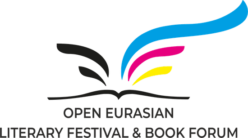
Страна :Объединенные Арабские Эмираты
Здравствуйте! Меня зовут Айжан и я с раннего детства пишу стихи ( фамильное хобби ) являюсь трижды номинантом Национальной Литературной Премии «Поэт Года» в РФ, член Лондонской Творческой Гильдии, Американской Ассоциации Продвижения Наук, Основатель и руководитель экологического проекта по сохранению водных ресурсов SLB ( Save Lake Balkhash ) International, работаю в сфере проектного и программного управления, публикую статьи на профессиональные темы, очень люблю природу и животных.
Country: United Arab Emirates
Hello, my name is Aizhan and I am the founder of the Save Lake Balkhash International Project which aims to educate, inspire and motivate people from around the globe to become more environmentally conscious and manage water resources wisely and efficiently. I write poems since I was 6 years old, now publishing some of them and participating in the top National Awards in Russia. During the last three years I became three times national nominee for the «Best Poet» award in Moscow. I work in project and program management multi-sector. Nature and animals is what I love and take care of.
Отрывок из научной работы “Lakes Preservation Methodology — Case of Saving Lake Balkhash“
Decarbonisation is a historic challenge for the global market, no matter the sector or segment. After COP 26 it is clear that a combination of collaboration, innovation and ex pert engineering will be integral to enabling the global decarbonisation process. Among many proven clean technologies available now on the market the most important are re lated to the fresh water preservation and lakes here present a major interest in terms of climate change risks mitigation and agricultural development. Connecting land and sea, they enable fish and waterbird migration as well as storing and regulating water flow, helping to mitigate temperature increase and provide food security to people residing in the lakes’ areas. Amid the increase of the climate change risks the importance of the lakes as the main climate change mitigators directly linked to the agriculture and food security, as they recharge groundwater aquifers and moderate droughts will create glob al agenda for the lakes preservation methodology development requiring the attention of international experts and water field professionals.
Based on my analysis of 75 international cases, the best available technical approach in preserving lakes is an activity — based approach and it is dependent on the nature of such activities. Very important to keep social integration of the civic activity not getting attached to any political or economic factors, so the DNA of such initiatives remain authentic. Methodology of environmental law should not be restricted to developing envi ronmental legal frameworks. It is more about creating efficient control systems that in clude legal means of control and monitoring of the water subjects ( lakes, rivers, ponds, etc.) Failure to restore aquatic ecosystems will result in sharply increased environmental costs later and a permanent ecological damage.
In Written in Water, published by National Geographic ( page 255 ) — “The issues of clean water and sanitation cannot be separated. Rural water sources in developing countries are frequently contaminated, and even if there is a more healthful source, added dis tance, fear of travel, and time constraints may result in women’s obtaining, or accepting, lower quality water — not only in rural settings, but also in cities, where clean water may be priced out of reach for the poor or otherwise unavailable…”In order to prevent this the effective water resources management system should be employed and integrated into the national resources management system. During my stay in the Untied Arab Emirates I witnessed a very effective in its application a water-saving technology of the irrigating piping systems. If by any chance someday you will pass Dubai Marina Walk in Dubai, you will notice that every palm tree planted there is being irrigated by a constantly moni tored piping feeding system. In case of a leakage the problem is to be resolved immedi ately. Date palms require an average of 300 litres of water per day, as we can see it is a a big amount of precious resource needed for irrigation.
Innovative desalination plants, effective management of the piping systems, constant quality control and monitoring, leakages prevention are basic control means of the water management strategy here in the UAE and it all has a great social outcome — high quality water being available to every stakeholder, starting from a date palm to a new born baby. I would love to see this level of leadership and management dedication in my homeland.
In 2019 I founded a pro bono environmental Save Lake Balkhash International Project. The goal of this project was clearly communicated to the population and local govern ment by social media means and project talks. While advocating the lake Balkhash in Kazakhstan, I started to create a methodology of the ecology project conceptualisation and implementation and I tried my best to figure out how to answer the following ques tions, it is still an ongoing process. Let me share some of my findings with you:
1) Everything starts with legislation and the local Water Code plays huge role in monitor ing malefactions within water regulations system. The question of how it should be changed and optimised and the real necessity of such changes remains crucial. I sug gest there should be a special committee assigned to monitor the relevance and timeli ness of such Water code.
2) Accepting the power of social factor. Building effective and sustainable communication channels. This refers to the importance of clear and honest information exchange be tween involved stakeholders.
3) The necessity of cluster approach in ecological project management.
As per my professional experience, People — Economy — Nature — Technology all interre lated domains which are constantly changing and influencing each other. Cluster ap proach in ecology management means not prioritising a particular domain, but providing equal and measured recognition of the importance of each and simultaneous coordina tion of the resources distributed between all of them.
4) Required organisational measures. Being ecologically proactive is a primary require ment of any ecological project. It means taking steps and providing actions towards sav ing a nature. It also includes organising certain events and leading communities.
5) Ecological passivity of the people and its true reasons. Why people are so inactive when it comes to saving a nature? Is it necessary to pay in order to get promoted? And why it is so essential to find people whom you can trust and work with.
6) Importance of trust in authorities. This is the biggest issue. Culture eats strategy everywhere, despite region or sector of economy / social integration. To survive — any strategy must gain a support from local authorities. It relates to business, government. How to balance between personal beliefs and authoritative restric tions? Is it possible to speak ecological truth, while communicating with government?
7) COMmunication — COMmunities — COMmon sense. Communication creates communi ties and communities are based on common interests. It is quite obvious that nature has a common sense to everyone. We all are integral parts of the society and nature. Why then it is so hard to save it? Are human flaws stronger than virtues? Is corporate greed managing all top-level decisions or a good sense still has its guarding skills and wins custody against bad faith.
In 1992 the theme of integration between environment and social development was ap proached during UNCED ( the United Nations Conference on Environment and Devel opment ) which took place in Rio de Janeiro, Brazil.
Principle 4 of the Declaration signed during this Conference captured the following chal lenge: «In order to achieve sustainable development, environmental protection shall con stitute an integral part of the development process and cannot be considered in isolation from it…»
The two past years illuminated the true meaning of health, security and inseparable link we all have with Mother Nature, please, pardon my linguistic personification of the envi ronmental forces in this sentence, but it never seemed more real than during this year, that humanity is constantly being monitored and managed by some kind of higher power, shall we call it a Mother Nature or God’s will, respect must be paid accordingly.
Being a certified project and program management professional with over 15 years of experience I revised several ecological initiatives and came up with the idea of creation a unified methodology on water fund management, taking into consideration current global water crisis and lack of quality fresh water reserves around the globe.
Every methodology starts with the definition. The project itself changed the meaning dur ing past year. I would redefine it as a time-bound endeavour aimed to create a unique result in terms of constant and unpredictable changes. Therefore, the main focus now is on change management and leadership skills, rather than process orientation. Ecologi cal projects are becoming landmarks of new approaches and techniques as well as in novations. They are based on saving nature capital and providing benefits to stakehold ers ( which are all human beings ) whilst creating a new value of social integration and collaboration.
After hours of online sessions and discussions with my colleagues and ecology mentors, I proposed to replace the classical ROI ( return on investment ) approach with SROI ( social return on investment ) explained by the following formula : SROI = ( Social Im pact Value — Initial Investment Amount ) / Initial Investment Amount *100% where 1) Social Impact Value is an integral factor, consisted of different indicators, basi cally they are total comprised benefits from saving / preserving a unit of nature capital ( such as national park, lake, pound, river, etc. ) 2) Initial Investment Amount — total sum of invested capital, such as monetary funds, human and social energy, time, knowledge.
Important to mention that above discoveries were made by me due to the continues work on the Save Lake Balkhash International Project based in Dubai, UAE where this project grew from local to global during months of 2021.
Back to Spring 2020, I have analysed the water management strategies of some coun tries in order to mitigate risks in my homeland, Kazakhstan. I found out that in Germany there is a preference for the rational water saving over the building a new water in frastructure. In Singapore it is trendy to be ecologically informed and local industries ef fectively use high tech desalination plants, France successfully manages its water reaizhanussenaliyeva@gmail.com Thursday 6 January 2022 sources through the effective legislation ( taxation, primarily ) and biodiversity preserva tion, and in Brazil local government pays high attention to the elimination of leaks in sewage and plumbing systems.
It is obvious that every country has its own issues with water and the importance of sus tainable, result-oriented strategy is never overestimated. The same applies to air, soil and forest preservation. Ecology is now a popular word. But the meaning of it never changed. True wealth of each country is defined by the purity and safety of natural re sources it possesses. Indeed, only nature allows our bodies to function.
With reference to Paris Agreement ( page 4 ) “ Acknowledging that climate change is a common concern of humankind, Parties should, when taking action to address climate change, respect, promote and consider their respective obligations on human rights, the right to health, the rights of indigenous peoples, local communities, migrants, children, persons with disabilities and people in vulnerable situations and the right to develop ment, as well as gender equality, empowerment of women and intergenerational equity, recognising the importance of the conservation and enhancement, as appropriate…”
I find that in UAE climate change risks are addressed and managed appropriately. In July 2021, while living in Dubai I got inspired by local environmental practices and high quality water management strategy, so I have developed the list of technical solutions to the desertification process of the lake Balkhash : 1) Lake well system design and main tenance 2) Wetland flooding 3) Lake bottom dredging 4) Deepwater currents manage ment — groundwater recharge. I thank Dubai for becoming a place of origin for these ideas and methods.




 (3 оценок, среднее: 5,00 из 5)
(3 оценок, среднее: 5,00 из 5)![]() Загрузка…
Загрузка…

